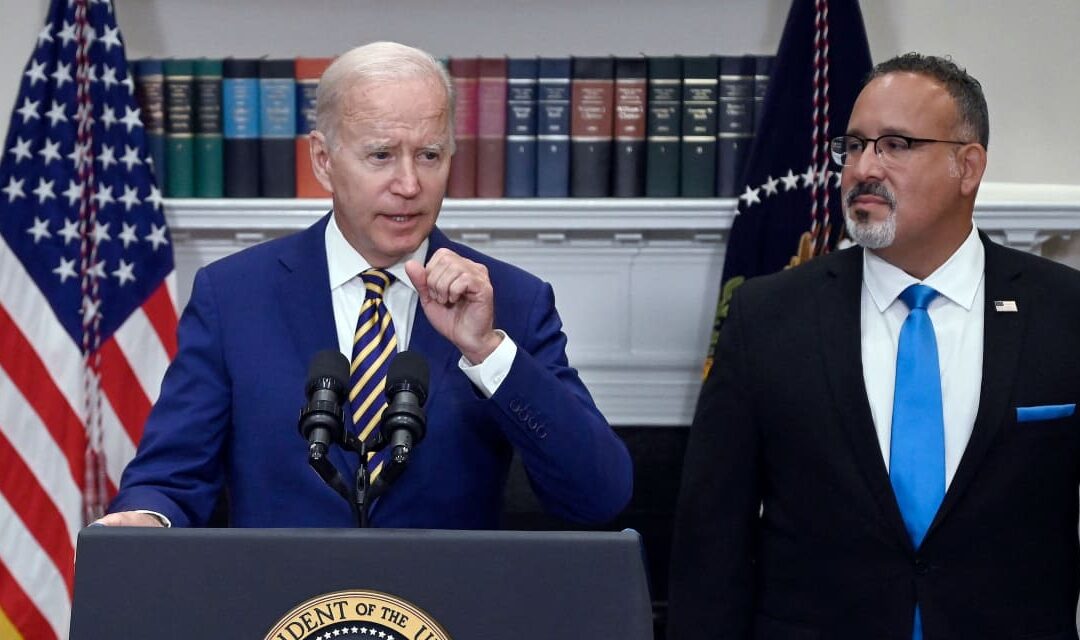Student-loan borrowers who took out relatively small amounts to attend college and have been paying their debt for at least 10 years could have their loans forgiven as soon as February — as long as they’re on the Biden administration’s new repayment plan, officials announced Friday.
Under the SAVE plan, which the Department of Education launched earlier this year, borrowers who took on $12,000 or less in loans are eligible to have their debt canceled after at least 10 years of payments. Originally, that benefit wasn’t supposed to be available until July, but on Friday, the department said it would start implementing the initiative in February.
Officials didn’t say how many borrowers it would impact, but said they would be identifying the beneficiaries over the next few weeks. Borrowers who took out $12,000 or less, have been in repayment for at least 10 years and who are already enrolled in SAVE won’t have to take any action to receive the relief. The Education Department is also embarking on an outreach and email campaign to encourage borrowers to sign up and potentially take advantage of shortened timeline to forgiveness.
“This action will particularly help community-college borrowers, low-income borrowers, and those struggling to repay their loans,” President Joe Biden said in a statement announcing the initiative. “And, it’s part of our ongoing efforts to act as quickly as possible to give more borrowers breathing room so they can get out from under the burden of student-loan debt, move on with their lives and pursue their dreams.”
The return to repayment is proving complicated
Friday’s announcement comes as borrowers and the government report long call-wait times, missing or inaccurate bills and other challenges complicating the return of student-loan payments after a more than three-year pause.
Some of these issues have the potential to pose obstacles to borrowers receiving the relief announced Friday. As of October, more than 450,000 applications for income-driven repayment plans, including SAVE, were still pending with a borrower’s servicer for more than 30 days. A senior Education Department official told reporters on a conference call that the backlog had receded since October.
“I don’t have a number to share with you, but it is a smaller number than what was reported at the time of the CFPB report,” the official said.
So far, about 6.9 million borrowers have successfully enrolled in SAVE, the Education Department said Friday. The bulk of those borrowers were automatically transferred from a different repayment plan.
Under SAVE, borrowers pay their debt as a percentage of income and typically have the remainder canceled after 20 or 25 years of payments. SAVE is the latest version of income-driven repayment which has been around for years, but it includes new benefits.
Borrowers were able to access some of the new features last year. For example, the interest that a borrower’s monthly payment doesn’t cover is wiped out and the plan protects more of a borrower’s income before payments kick in. Of those enrolled in SAVE so far, roughly 3.9 million qualify for a $0 monthly payment, the Education Department said.
Other benefits of the plan are scheduled to kick in later this year. Originally the shortened timeline to forgiveness for some borrowers was supposed to take effect in July, but the Education Department is launching the benefit early, officials said.
By focusing on borrowers with relatively low balances, the agency is aiming to target a benefit to a group who is disproportionately likely to struggle with student debt, officials said. Often the low balance can be a sign that a borrower didn’t complete their degree or earned a credential with relatively little value in the labor market.
In addition, providing loan relief to those who took out $12,000 will wipe away the debt of 85% of future community-college borrowers within 10 years, the Education Department said.
Friday’s announcement is separate from other forgiveness efforts the Biden administration has previously touted. So far, the Department of Education has approved $132 billion in debt cancellation for more than 3.6 million borrowers. Those include borrowers who have been paying their loans for at least 20 years, some public servants and borrowers who have been scammed by their schools.
In addition, the Biden administration is in the process of revamping its broad-based debt-relief proposal after the Supreme Court struck down its initial plan to cancel up to $20,000 of student debt for a wide swath of borrowers in June.
The new debt-forgiveness initiative isn’t finalized, but Biden administration officials have indicated it would focus on certain groups of borrowers, including those who have been paying for a long time and those who owe more than they borrowed.









